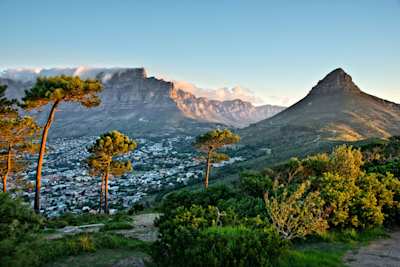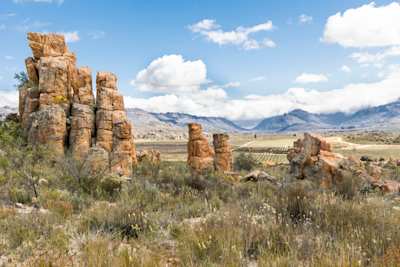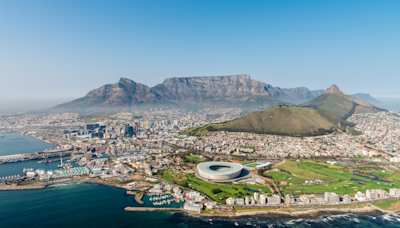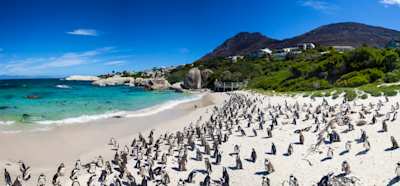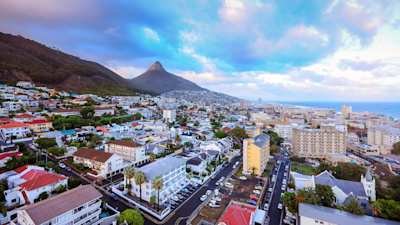The Ultimate Travel Guide to Cape Town: Everything You Need To Know
Whether you’re travelling solo, with your other half, or with friends and family, here’s everything you need to know about this vibrant South African city
~
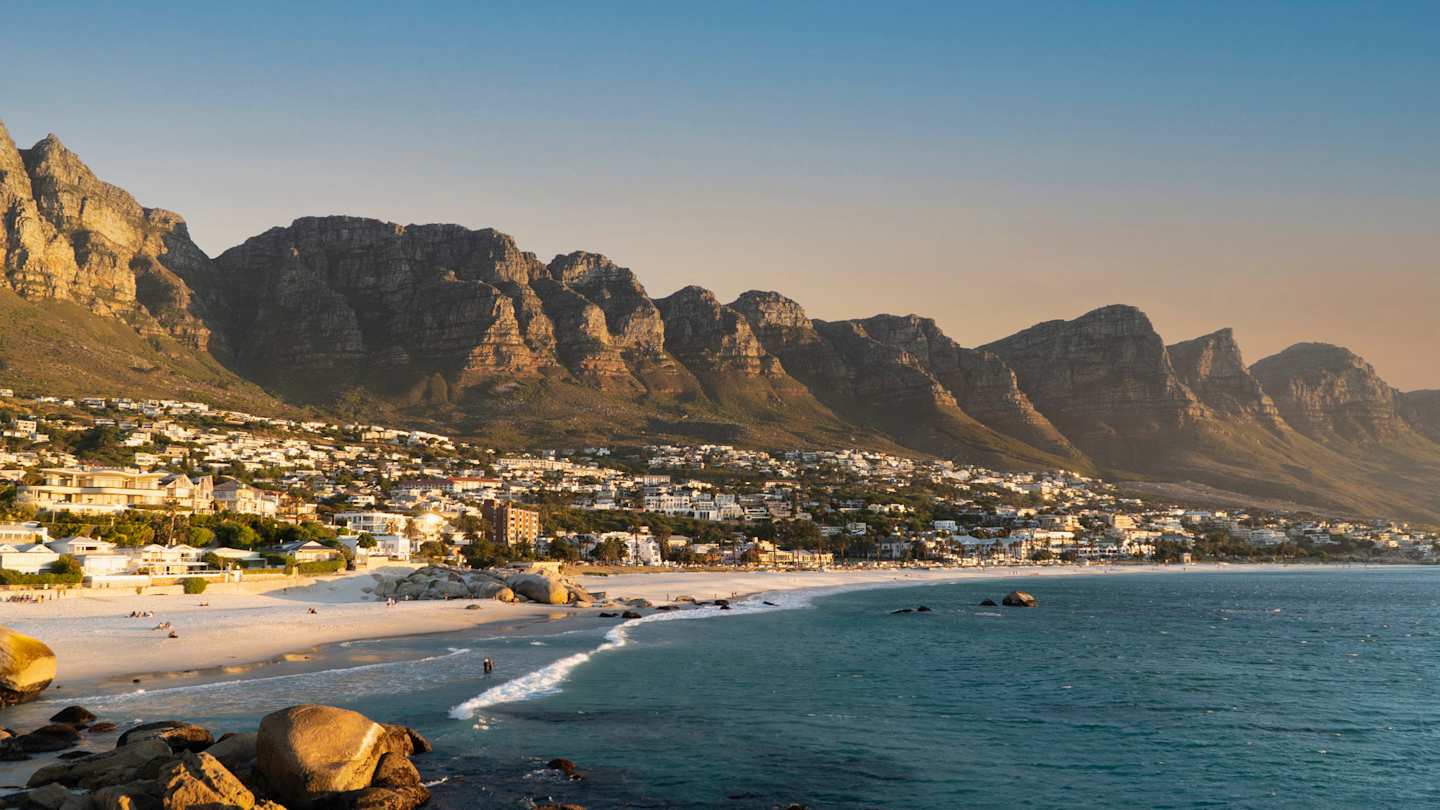
With its epic coastal scenery, towering mountains, fascinating culture and mouth-watering food and drink, it comes as no surprise that Cape Town is an amazing holiday destination. Thinking of a vacation here? You’ve come to the right place. Our travel experts at Plum Guide have all the need-to-know info about the Mother City, from where to stay to what to see, do and eat. Keep reading for your essential travel guide to Cape Town.
General info about Cape Town
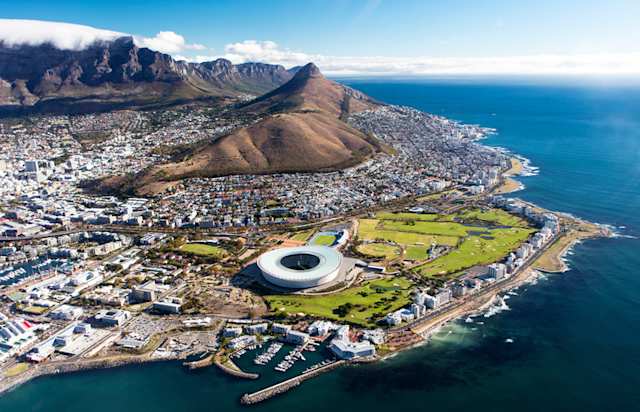
Aerial view of Cape Town, South Africa from helicopter with a view of Table Mountain, stadium and Atlantic Ocean, Cape Town
Cape Town has a long and complicated history that spans centuries. Initially inhabited by indigenous groups like the San and Khoikhoi people, the first European settlers arrived in the 15th century. From then on, the city has undergone Dutch colonisation, British rule, and the apartheid era. In 1994, the apartheid era ended with the election of Nelson Mandela, and Cape Town consequently transformed into a thriving, multicultural city and tourist destination.
Best time to visit Cape Town
Being in the southern hemisphere, January is the peak of summer in Cape Town. This is when it’s hot and sunny, and crowds are at their busiest. If you want to avoid the tourists, we recommend visiting in the shoulder months of March to May and September to November. The weather is still pleasant and there are fewer crowds, so you won’t have to fight for space on the beaches.
How to get to Cape Town
The easiest way to get to Cape Town is by plane. The Cape Town International Airport is well-connected with domestic and international flights. If you’re travelling intercity, there are also train and bus connections with other South African cities.
Top activities and attractions
Hiking
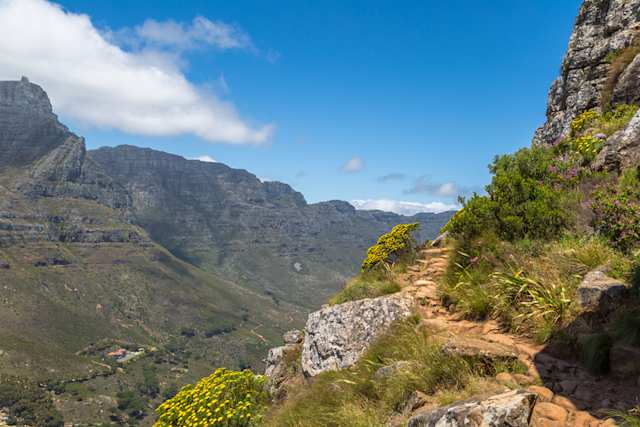
Hiking trail with views over Cape Town, the Atlantic ocean and Table Mountain, leading to the top of Lion's Head in Cape Town
Cape Town is one giant playground for outdoor enthusiasts and nature lovers. Hiking is the best way to appreciate the views, and one route you can't miss is Table Mountain. At 1,086 metres, this iconic natural landmark boasts magnificent vistas over the city. Other popular hikes to add to your list include other notable landmarks like Lion's Head, Devil's Peak, and Signal Hill, all of which offer panoramas of the city, coast, and surrounding countryside. Be sure to pack comfortable shoes – chances are, you'll take on at least one trail while you're in town.
Water sports
Cape Town is a particularly popular place for surfing. For beginners, a great place to start is Muizenberg Beach, while pro surfers can head to Llandudno, Dungeons and Outer Kom. Cape Town’s strong and consistent winds are also great for kitesurfing, and favourite spots include Bloubergstrand and Langebaan. Try scuba diving and snorkelling to experience the rich marine life and ghostly shipwrecks, or take a kayak or sailboat out into the ocean, where you’ll see the coastline from a different perspective. For thrill-seekers, get up and personal with great whites with shark cage diving.
Wine tasting
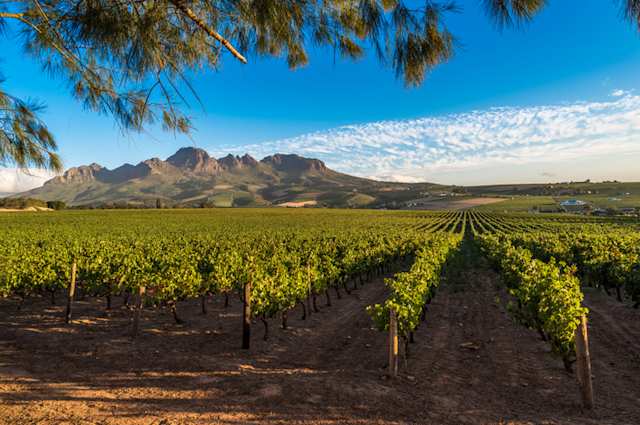
Vineyard in Cape Winelands facing mountains, Cape Town
Just an hour’s drive inland from the city is Cape Winelands, South Africa’s primary region for wine production. Some of the most well-known areas include Constantia, Stellenbosch, Durbanville, Paarl, and Franschhoek, and there are numerous wine tours and trails to whisk you away to the various vineyards. Our favourite is Boschendal Estate, one of the oldest wine farms dating back to 1685 – expect farm-to-table food and award-winning vintages. No designated driver? Climb aboard the wine tram in Franschhoek for a hop-on-hop-off winery tour with eight different lines to choose from.
Museums and galleries
The city’s excellent museums are the best place to learn about Cape Town’s rich and complex past. A must-visit is Robben Island, home to a prison for political prisoners, including Nelson Mandela. The District Six Museum tells the story of the forced removals of over 60,000 residents of the District Six neighbourhood during the apartheid era, while the Bo-Kaap Museum offers a glimpse into the neighbourhood’s Cape Malay culture.
Wildlife watching

Three African penguins sitting on a rock in Boulders Beach with sea in the background, Cape Town
What would a trip to South Africa be without a spot of wildlife watching? Whether you catch a glimpse of the penguins at the famous Boulders Beach or take a boat tour to spot whales, dolphins, seals, and sharks, there's plenty to put on your itinerary. On land, Aquila Private Game Reserve is just a couple hours' drive from the city, where you can enjoy a 'Big Five' safari experience.
Hidden gems
You can't have a travel guide to Cape Town without a few hidden gems. Budding palaeontologists will love exploring the Karoo, a semi-desert region just an hour away from the city. Known for its Permian and Triassic period fossils of ancient reptiles, mammals, and dinosaurs, the Fossil Trail offers a chance to learn more about the Karoo’s prehistoric past.
To make the most of Cape Town’s incredible sea views, head to the spectacular promontory of Cape Point. Here, you can ride the Flying Dutchman Funicular, which takes you to the upper lighthouse for panoramic views of the coastline.
Best areas to stay in Cape Town
Camps Bay
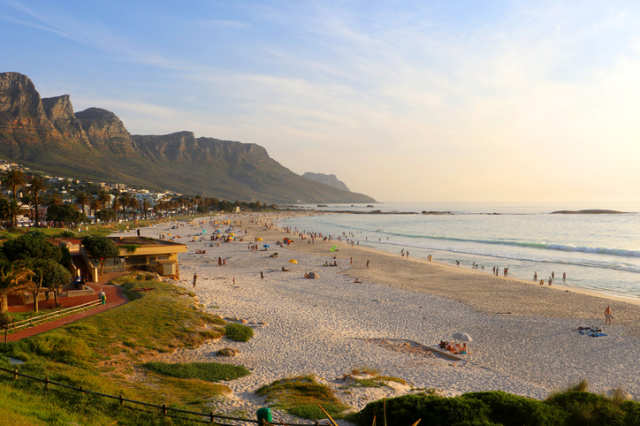
Camps Bay overlooking the Atlantic Ocean on a clear day in spring with tourists tanning and sunbathing, Cape Town
Considered one of the most coveted areas in Cape Town, Camps Bay is ideal for those wanting to be close to the coast. Located between the Twelve Apostles and pristine beaches, staying here gives you easy access to hiking trails, beaches, and water sports. There are also plenty of eateries nearby – no wonder it's popular with tourists and locals alike.
Bakoven
Bakoven is an exclusive residential neighbourhood tucked away from the crowds. To the south of Camps Bay at the foot of the Twelve Apostles mountain range, this spot offers panoramic views that are second to none. The sheltered Bakoven Beach boasts a lovely stretch of sand, calm waters and a laid-back atmosphere. It's a great place to try out watersports, including boating, fishing and snorkelling, or take on the trails around Camps Bay instead.
V&A Waterfront & De Waterkant
The V&A Waterfront is an upscale, bustling area best for those who want easy access to Cape Town’s top attractions. You'll find restaurants, art galleries and over 450 shops in this neighbourhood, making it perfect for those wanting a more cosmopolitan area to call home. Events and festivals are frequently held here, including concerts, art exhibitions and delicious food festivals. Nearby the V&A Waterfront is De Waterkant, a trendy little pocket with many coffee shops and bars.
Bantry Bay
Bantry Bay is a high-end suburb on the slopes of Lion’s Head and one of the best places to stay in Cape Town. Stellenbosch and other Cape Wine Routes are just a short drive away, so wine connoisseurs will enjoy it here. Saunders Beach is a great place to unwind, shop, and dine. It’s never overly crowded here, so you’ll likely enjoy uninterrupted views of the dramatic coastline.
Eating out in Cape Town
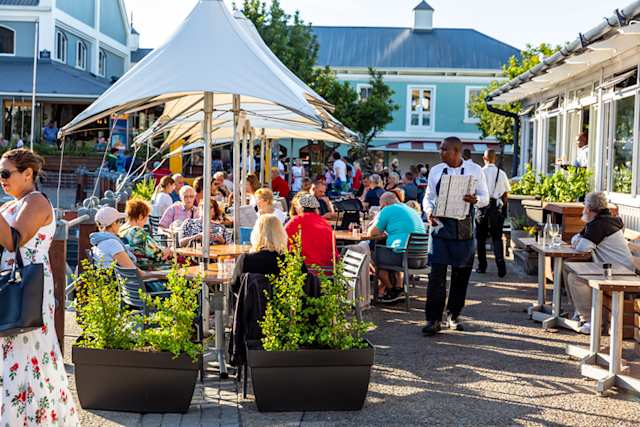
People dining alfresco at outdoor tables under umbrellas at restaurants in the V&A Waterfront, Cape Town
Food is an important part of any holiday, and we couldn’t leave it off our travel guide to Cape Town. The city is undoubtedly the culinary capital of South Africa – a true heaven on earth for any keen foodies. There is plenty to choose from, whether you want to sample something local or fancy international bites. Don’t miss out on Cape Malay cuisine, a major part of the community’s culture and a fusion of Southeast Asian, Dutch, and African flavours and ingredients.
Local delicacies
Among the local delicacies worth mentioning are bobotie (a casserole filled with curried minced meat baked with egg custard), bunny chow (a street food dish made from hollowed-out loaves of bread, filled with spicy curry), biltong and droewors (dried and cured meat similar to beef jerky), and koeksisters (sticky doughnuts with syrup or honey on top). On a hot summer’s day, a favourite pastime is to host a braai, South Africa’s version of a barbecue. Fire up the grill and tuck into boerewors (a fresh sausage made with minced pork, lamb or both, as well as spices like nutmeg, allspice and coriander seed), as well as sosaties (marinated lamb or mutton cooked on skewers).
Where to find food
With its thriving culinary scene, you’ll find everything from vegan eateries and health food cafes to fine dining restaurants. If you’re a meat lover, you’ll want to visit Cape Town’s renowned steakhouses such as The Butchershop & Grill or Nelson’s Eye Restaurant. If seafood is more your thing, perhaps you’ll prefer the menus at Fish on the Rocks or Codfather Seafood & Sushi, two of the many excellent seafood restaurants in the city.
One of the best places to find food is the numerous markets such as Neighbourgoods Market, the Oranjezicht City Farm Market, and the Bay Harbour Market which offer a wide range of street food, artisanal products, and fresh produce. Bree Street in the CBD (Central Business District) is also a can't-miss culinary hotspot.











